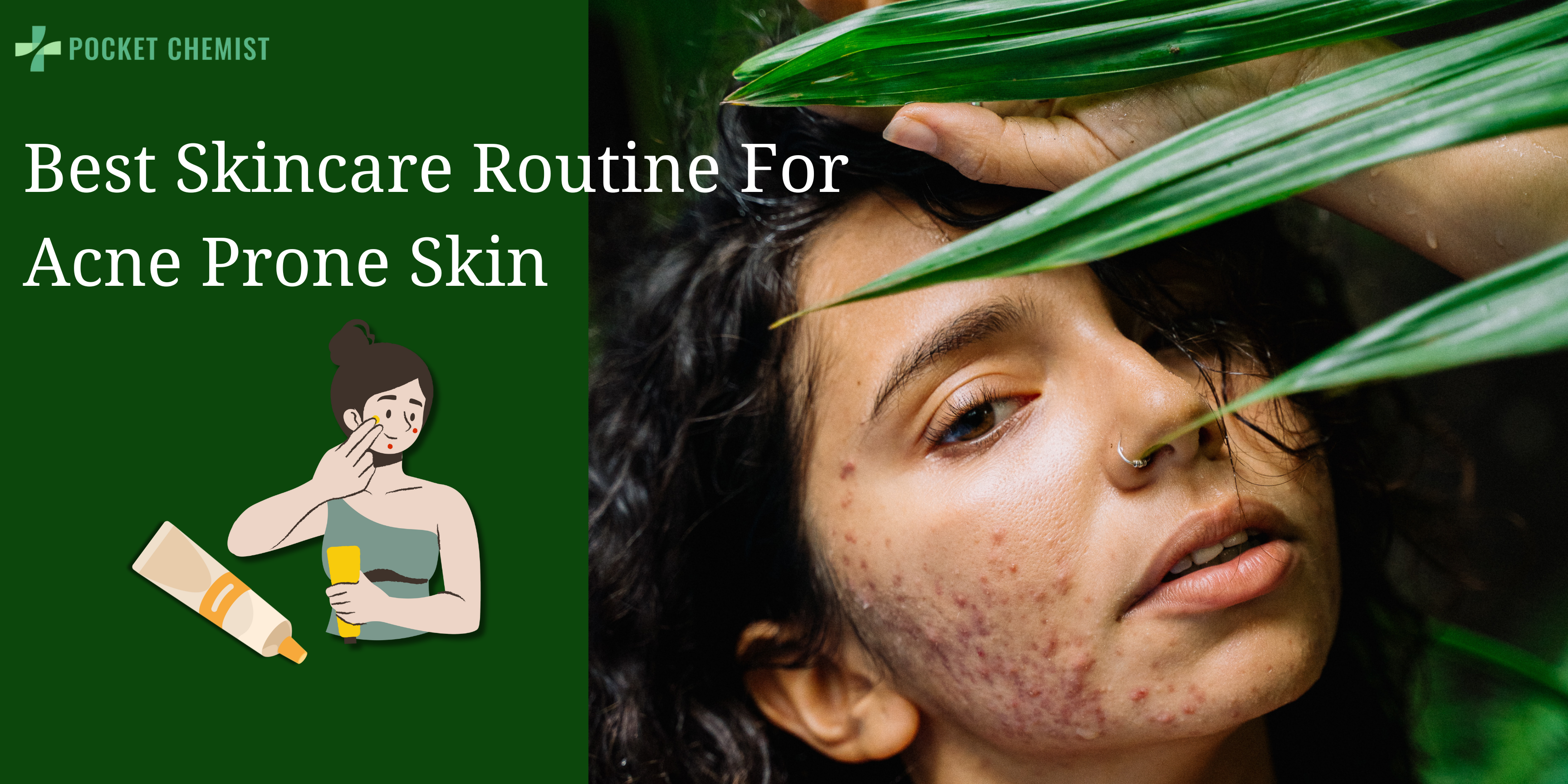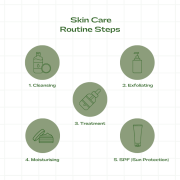Best Skincare Routine for Acne Prone Skin

Acne-prone skin is a common condition that many people face, followed by frequent breakouts and increased sensitivity. This type of skin tends to produce more oil, which can clog pores and lead to acne. Managing acne-prone skin effectively requires a tailored skincare routine that targets the specific needs of this skin type.
Understanding Acne Treatment Ingredients
Several key ingredients are known to help fight acne and prevent future breakouts. Here’s a closer look at some of the most effective ones:
Benzoyl Peroxide
Benzoyl peroxide works by killing the bacteria that cause acne breakouts. It also helps to reduce oil production and remove dead skin cells that can clog pores. Products like Persol Gel 2.5% are popular choices.
Salicylic Acid
Salicylic acid is a beta-hydroxy acid that exfoliates the skin, helping to unclog pores and reduce inflammation. It is particularly effective for treating blackheads and whiteheads.
Retinoids
Retinoids, such as tretinoin, are derived from vitamin A and work by promoting cell turnover and preventing the formation of new acne lesions. For example, A Ret Gel 0.025% is a common retinoid product.
Niacinamide
Niacinamide is a form of vitamin B3 that helps to reduce inflammation, regulate oil production, and improve skin barrier function. It’s gentle on the skin and suitable for all skin types.
Tea Tree Oil
Tea tree oil has natural antibacterial and anti-inflammatory properties, making it a popular natural remedy for acne. It helps to reduce the number of acne lesions and improve skin health.
Building Your Skincare Routine for Acne Prone Skin
Creating an effective skincare routine for acne-prone skin involves several key steps:

Step 1: Cleansing
Gentle cleansing is crucial for removing excess oil, dirt, and impurities without stripping the skin of its natural moisture. Look for cleansers specifically formulated for acne-prone skin.
Importance of Cleansing:
- Removes makeup, dirt, and excess oil.
- Prepares skin for other treatments.
- Prevents clogged pores and breakouts.
Recommended Cleansers:
- Gentle Foaming Cleanser: Look for cleansers that are gentle and non-comedogenic. A foaming cleanser can effectively remove impurities without stripping the skin.
- Salicylic Acid Cleanser: If you have frequent breakouts, a cleanser containing salicylic acid can help keep pores clear. Acnesol Gel is an example of a product with salicylic acid.
How to Use:
- Wash your face twice a day.
- Use lukewarm water and gently massage the cleanser onto your skin in circular motions.
- Rinse thoroughly and pat dry with a clean towel.
Step 2: Exfoliation
Exfoliating helps to remove dead skin cells and prevent clogged pores. Choose exfoliants that are suitable for acne-prone skin, such as salicylic acid-based products. Exfoliate no more than twice a week to avoid irritation.
Benefits of Exfoliation:
- Removes dead skin cells
- Unclogs pores
- Promotes cell turnover
Choosing Exfoliants:
- Salicylic Acid Exfoliants: These are ideal for acne-prone skin as they penetrate deep into the pores. Products like A Ret Gel 0.025% can help exfoliate and treat acne.
- Glycolic Acid Exfoliants: Glycolic acid is another option that helps with cell turnover and can be gentler on the skin.
How to Use:
- Exfoliate 1-2 times a week
- Apply the exfoliate after cleansing
- Avoid over-exfoliating, which can irritate the skin and worsen acne
Step 3: Treatment
Incorporate targeted treatments for acne, such as spot treatments and serums. Products containing benzoyl peroxide or salicylic acid can be particularly effective. Apply these treatments after cleansing and before moisturizing.
Incorporating Treatments:
- Benzoyl Peroxide: Effective in killing bacteria and reducing oil production. Start with a lower concentration and gradually increase as tolerated. Persol Gel 2.5% is a recommended product.
- Salicylic Acid: Helps to exfoliate and unclog pores. It’s suitable for treating blackheads and whiteheads.
- Retinoids: These increase cell turnover and prevent new acne formation. A Ret Gel 0.025% is a common retinoid product.
How to Use:
- Apply treatments after cleansing and exfoliating
- Use spot treatments directly on pimples or all over the face if directed
- Start with lower concentrations and increase gradually
- Be consistent and patient, as results can take several weeks
Step 4: Moisturizing
Hydration is essential for maintaining the skin barrier and preventing irritation. Choose lightweight, non-comedogenic moisturizers that won’t clog pores.
Importance of Moisturizing:
- Keeps skin hydrated
- Maintains skin barrier function
- Prevents overproduction of oil
Choosing Moisturizers:
- Lightweight, Non-Comedogenic Moisturizers: These won’t clog pores and are ideal for acne-prone skin.
- Gel-Based Moisturizers: Often lighter and less likely to cause breakouts.
How to Use:
- Apply moisturizer after treatments
- Use a small amount and gently massage into the skin
- Choose products that contain ingredients like hyaluronic acid for added hydration
Step 5: Sun Protection
Sunscreen is vital for acne-prone skin, especially when using treatments that can increase sensitivity to the sun. Opt for broad-spectrum, oil-free sunscreens to protect your skin without causing breakouts.
Importance of Sun Protection:
- Prevents sun damage
- Protects against UV rays
- Reduces risk of hyperpigmentation and dark spots
Choosing Sunscreens:
- Broad-Spectrum, Oil-Free Sunscreens: Protect against both UVA and UVB rays without clogging pores.
- SPF 30 or Higher: Provides adequate protection for daily use.
How to Use:
- Apply sunscreen as the last step in your morning routine
- Use a generous amount and reapply every 2 hours if exposed to the sun
- Choose a sunscreen that is specifically formulated for the face
Additional Skincare Tips
Avoiding Irritants
Identifying and avoiding ingredients that may exacerbate acne or cause irritation is crucial. Common irritants include heavy oils, fragrances, and harsh scrubs. Always check product labels and opt for non-comedogenic options.
Managing Stress
Stress can trigger acne breakouts by increasing the production of certain hormones. Incorporate stress-relief techniques such as:
- Exercise: Regular physical activity can help reduce stress.
- Meditation: Practicing mindfulness and meditation can calm the mind.
- Adequate Sleep: Ensure you get enough sleep to allow your skin to repair and regenerate.
Diet and Lifestyle
Your diet and lifestyle can significantly impact your skin. Here are some tips:
- Balanced Diet: Eat plenty of fruits, vegetables, and lean proteins. Avoid high-glycemic foods and dairy, which may trigger breakouts.
- Hydration: Drink plenty of water to keep your skin hydrated.
- Healthy Habits: Avoid smoking and limit alcohol consumption.
Answering Common Questions and Concerns
What skincare should I use if I have acne?
For acne-prone skin, use gentle cleansers, exfoliants with salicylic acid, treatments with benzoyl peroxide or retinoids, non-comedogenic moisturizers, and oil-free sunscreens.
How do I start a skincare routine for acne-prone skin?
Start with a gentle cleanser, then add an exfoliant, followed by a targeted treatment, a moisturizer, and sunscreen. Introduce one product at a time and observe how your skin reacts.
Does salicylic acid make your acne worse?
Salicylic acid generally helps improve acne by unclogging pores and reducing inflammation. However, overuse can cause dryness and irritation, so it’s important to use it as directed.
How to clear up acne fast?
To clear up acne quickly, use targeted treatments like benzoyl peroxide or salicylic acid, maintain a consistent skincare routine, avoid picking at your skin, and consult a dermatologist for severe cases.
What acne-prone skin should I avoid?
Avoid heavy, greasy products, harsh scrubs, and products with high alcohol content, as they can irritate and worsen acne.
Conclusion
Managing acne-prone skin involves a consistent and personalized skincare routine. Understanding the key ingredients and steps in your routine can make a significant difference in your skin’s health. Always consider consulting a dermatologist for personalized recommendations based on your specific skin type and concerns.
By following these guidelines and being patient with your skincare regimen, you can effectively manage and reduce acne breakouts, leading to clearer, healthier skin.

